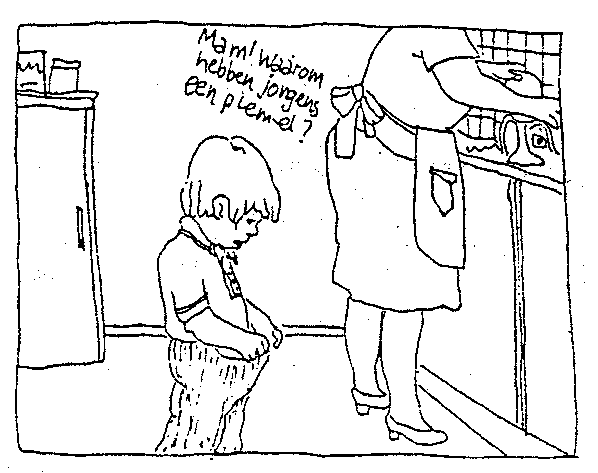|
1. There
appears to exist an Oedipal phase and the human has to go through the complex
feelings of this phase to grow to an own identity. Usually, this process happens
unconsciously. Because of this, not everybody sees its existence and not
everybody beliefs in the existence. Nevertheless, it does exist. There is given
enough clinical prove of it. We cannot see the electro-magnetic forces
around us, but nevertheless these forces do exist. Oedipal rumble exists, but
one only gives attention to them if something has gone wrong.
2. I have
experienced the existence of this psychic forces, and that the may have
long-term influence on human life. I have also experienced that problems can
resolve themselves
 |
if, firstly,
the problems before the Oedipal phase are resolved -- in my case: the
ancient stew, the rest of an early-childhood depression -- |
 |
and if,
secondly, one gives room and time to the self-repairing ability of the
human soul. |
3. A good
relationship between the mother (or her male or female substitute) and the child
is the fundament of all further development. If we take this idea for serious,
it has far reaching consequences, for example for the maternity leave. The
mother must not only be present, but also actively make contact with the baby
and be available for the baby. This asks for careful attention for problems like
post-natal depression and other problems that make the mother difficult to reach
for the child.
|
4. Psychologically
spoken, the father comes later in the picture for the young child, but he
is no less important. He has to be present for a boy and a girl as an
attractive figure.
Absent fathers have been a
problem in a great part of the 20th century. Fortunately, this
has changed: modern fathers are more friendly and intimately than their
fathers. This is important, especially for boys.
In my opinion, and in
Pollack's (1999) opinion, nowadays, there is still too less contact with the deeper
inner of the boys.
They become, in my opinion, too much only
sturdy showing off. More emotional contact from early childhood on would
give more chance to the other sides of their characters, so that boys can
grow more to a whole personality. This might diminish several
problems we now have in society with teenage boys. Our boys should be more
independent of only experiencing 'kicks'.
|

W. Pollack, Real
Boys, Random House, New York 1998 (Dutch version). |
5. Of crucial
importance is not only the presence and the availability of the parents (or
their substitutes), but especially the quality of the contact with the child.
There must be contact with the inner of the child: the feelings, the
fantasies, the playing with teddy bears and dolls. As soon as the child is able
to speak, its questions are important.
It is important, at first
to accept the child's inner world as it is, even if one still does
not understand it. Understanding may be the next step -- at least trying
to understand, to be wondering what lives in the child's soul.
|
Questions about sexuality
have to be answered as open as possible from the start. One should know
that the child already intuitively or instinctively has such knowledge, so
it is better to also speak about the same. The child has to discover the
difference between the gender and the generations, and has to cope with
it.
|

"Mom,
why do boys have a willie?" |
|
6. The importance of
the quality of the contact is also important for male and female
substitute caregivers and for therapists and counselors. In this sense,
contact is, by definition, personal.
Impersonally and distantly using methods and social-technical skills
does not work, or works contrarily. Methods and social technologies
should only, and only if necessary, be used to establish the contact, and
may, only with this aim, and only as far as necessary, control the
behavior.
This is, by the way, also
the conclusion and the main thread of the methodology I have developed in my
doctor's dissertation Conflict &
Contact.
|
One has to acknowledge and accept, for example, aggression, sorrow,
impotence, resistance ... and so on, as a meaningful aspect of humanity,
for oneself as well as for other humans.
One should as far as possible try
to recognize these shadow side feelings in one's own inner.
This is not
easy. It asks to have an eye for one's own shadow side, and to accept it
as a meaningful aspect of oneself.
Gieles 1992, p. 238.
.
|
There I speak about
"contact including the shadow side, including one's own shadow
side.
7. Again, an
early-childhood depression appears to be a serious problem (see: Narcissim).
It is not possible to always prevent this, nor is this necessary nor always
good. It are the first frustrations and disillusions who start the development
as an individual personality. But, especially in the case of a depression, a
good contact with the inner of the child is necessary. If there is such a
contact, one may trust on the child's inborn self-repairing ability.
People who have the
power to decide about peace or war, asylum or exile, reunification or split of
the family, arrangements concerning parental access or baby-sitting, maternal or
care-giving leave, must know their great responsibility for the contact between
mother and child -- and thus for early-childhood depressions -- and have to bear
the consequences of this responsibility. The interest of the child is important,
not the interest of the state, the economy or public morals.
8. Divorce
may be inevitable and even may be fruitful. However, for the child it is crucially
important to have both parents reachable and available. Usually, such
problems concern the father figure. It is pernicious to portray the father as
the bad man, and to create a coalition between mother and child that combats and
banishes the father.
9. The
differences between gender and generation is a biological fact that is nestled
within our genes. Each child has to learn these differences, and this especially
happens in the Oedipal phase. It is not good to make a mixture of gender and
generation (like 'It does not matter if you are a boy or a girl,' respectively
'... a child or an adult') -- No, it does matter.
On the other hand,
the difference is only important in the sexual and procreative meaning. There is
no good reason to keep boys and girls, or children and adults, separated or to
avoid contact or to keep the contact distant and superficial. Intimacy and
personal contact are conditions for grow and development. One should not avoid
these contacts because of fear of sexuality.
Sexual contacts
between the generations should be avoided. The limit here is not the age but the
feelings. As long as youngster views an adult as belonging to the former
generation, one should avoid sexual contacts, but not intimacy because of fear
of sexuality. On the other hand, a gay teenager may have sexual contact with
the sportive twenty who he or she has chosen as a friend and a guide. In this
case, there is no view that the other belongs to a former generation.
|
10. No parent is
perfect and we do not need to be perfect. There may be circumstances that
hinder good contact or make it impossible, and so inevitably call to life
depressive feelings. This is as such not insuperable because of the inborn
self-repairing ability of every child.
Nevertheless, this
self-repairing ability needs a basis and needs food in the form of a good
contact with a third person, a Vitalis, who feeds and maintains the
vitality of the child. This third person may be a therapist, but
this not always necessary. It may also be a teacher, pastor, child care
worker, youth leader, foster parent or a self-chosen older male or female
friend.
Respecting the limit
between the generations, if viewed as such, there should be room for personal
contact, contact with the inner, and intimacy: room for Warmth
and Intimacy.
Also in this respect, it is
the interest of the child that counts, not the interest of the state, the
economy, a chosen theory or an appointed methodology, or public
morals.
This is the moral of this story.
|
So the point is:
- Not to be afraid to give warmth physically as a child care worker;
not to give way to the fear of "what people might think of me".
[...]
- To create within the team such a climate that as a house parent you can
talk about all the feelings of tenderness or love also the feelings you
have about your work, the irritations, being crazy about something.
Bronfenbrenner
wrote:
"Every child needs at least one person who is crazy about
him or her"
(Cited by Maier in The
core of care, 1979).
All this is extremely difficult: our culture, our education, certain
theories about child and education, and our language seem to obstruct us.
We are swimming against the current. For the children who need our warmth
so much, we will perhaps be strong nad courageous enough to swim against
that current; cautiously, but vigorously.
Gieles 1983/'87, Warmth and Intimacy...
.
|
|

